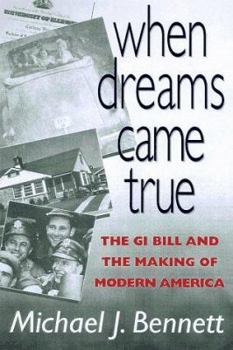When Dreams Came True (H)
Select Format
Select Condition 
Book Overview
When Dreams Came Truedescribes the making of modern America by the passage of the GI Bill in 1944 and the initiative of hundreds of thousands of ambitious veterans. Insightful and heartwarming, this... This description may be from another edition of this product.
Format:Hardcover
Language:English
ISBN:1574880411
ISBN13:9781574880410
Release Date:October 1996
Publisher:Potomac Books
Length:336 Pages
Weight:1.75 lbs.
Dimensions:1.2" x 6.4" x 9.6"
Customer Reviews
3 ratings
Best Book on GI Bill
Published by Thriftbooks.com User , 17 years ago
This is without question one of the best books on the history of the GI Bill and its impact on America. I found it to be well researched and an enjoyable read. Clearly, the secret to the success of the GI Bill is that it was an earned benefit that changed the social dynamics of America by creating "middle-class" America, creating "suburbia", putting veterans' back into the workforce, and opening the doors of colleges to a population of citizens that would have never received a college education. One of the greatest pieces of social legislation ever enacted. Leaves readers with one unanswered question: "Why aren't today's veterans worthy of the same benefits?"
GI Bill Indepth
Published by Thriftbooks.com User , 23 years ago
Michael Bennett's When Dreams Come True is a great in-depth study of the history around the creation of the Serviceman's Readjustment Act of 1944. He includes a great historical look at the support (or lack of support) that veterans received prior to World War 2 and then continued with a detailed study of the political process that ultimately led to the creation of the GI Bill. The book is easy to read, but very detail in nature. Those looking for a quick, general read might look elsewhere.
An insightful, informed, inspiring story of the GI Bill.
Published by Thriftbooks.com User , 25 years ago
Bennett set twin goals for himself: " . . . to make scholars realize how significant the GI Bill was in shaping American society over the past fifty years, and to tell a great story for not only those who benefited from the bill but also their children and grandchildren". Bennett chose the right target audience and he masterfully achieved his two goals.As the war was nearing its end, America's leaders began to contemplate the domestic challenges that peace would bring. GI Joe would be leaving the battlefields of Europe and the beaches of the Pacific. He fully intended to cast off the chains of the depression and regain his rightful place on the assembly line, at the check out, in the classroom, and behind the plow.Many in the Administration and Congress recognized that this transition might not be an easy one. Years of global conflict had already altered America. GI Joe had marched off to war in the aftermath of the Great Depression. Pre-war America was predominantly agrarian, isolationist, and rural. Post-war America was victorious, increasingly industrial, worldly, and urban. The post war changes in the U.S. would be dramatic. When Dreams Came True details the pivotal role that the GI Bill played in that metamorphosis.Bennett relates the tortuous path of the act from inception to enactment. The American Legion, editor Walter Howey, publisher William Randolph Hurst, Representatives Edith Rogers and John Rankin, and Senator Bennett Clark, were unlikely companions on the road to passage of the GI Bill. Thanks to Representative John Gibson's tie breaking vote, the language that became the Servicemen's Readjustment Act of 1944 emerged from a near-deadlocked House-Senate committee almost in step with the relentless troop movement inland from the Normandy beaches.Two aspects of the GI Bill sculpted the most dramatic changes to the face of America. Bennett claims that the bill's educational benefits and home ownership provisions were largely responsible for the birth of the American middle-class way of life. He makes a compelling case.Veterans in the millions-many who had never dreamed of higher education-flocked to the nation's colleges and universities. This flood was both unprecedented and unexpected. Pre-war, a college education was generally the province of the country's elite. There were just under 213,500 college degrees conferred in 1942. That number rose steadily in the decade after the war and stood at just under 455,000 by 1951. The GI Bill of Rights made it possible for many returnees to select higher education in lieu of immediately joining the labor market. Thousands of veterans chose formal education-and many elected to attend the better-quality schools.The GI Bill's home loan guarantees for veterans also significantly altered the American scene. There was more involved than merely home ownership. During the war veterans had learned to live side-by-side with people from different






